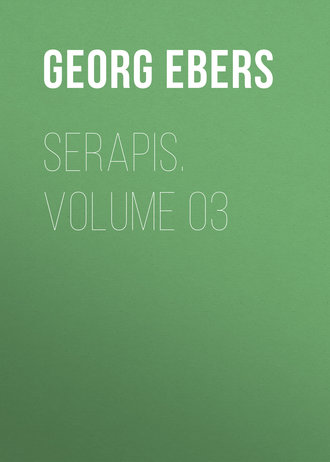
Georg Ebers
Serapis. Volume 03
"Agne."
"Agne, or the lamb. A pretty, good name! It is a name I love, as I, too, am a shepherd, though but a very humble one, so trust yourself to me, little lamb. Tell me, why are you crying? And whom do you seek here? And how is it that you do not know where to find a home?"
Eusebius spoke with such homely kindness, and his voice was so full of fatherly sympathy that hope revived in Agne's breast, and she told him with frank confidence all he wanted to know.
The old man listened with many a "Hum" and "Ha"—then he bid her accompany him to his own house, where his wife would find a corner that she might fill.
She gladly agreed, and thanked him eagerly when he also told the doorkeeper to bring Papias after them if he should be found. Relieved of the worst of her griefs, Agne followed her new friend through the streets and lanes, till they paused at the gate of a small garden and he said: "Here we are. What we have we give gladly, but it is little, very little. Indeed, who can bear to live in luxury when so many are perishing in want and misery?"
As they went across the plot, between the little flower-beds, the deacon pointed to a tree and said with some pride: "Last year that tree bore me three hundred and seven peaches, and it is still healthy and productive."
A hospitable light twinkled in the little house at the end of the garden, and as they entered a queer-looking dog came out to meet his master, barking his welcome. He jumped with considerable agility on his fore- legs, but his hind legs were paralyzed and his body sloped away and stuck up in the air as though it were attached to an invisible board.
"This is my good friend Lazarus," said the old man cheerfully. "I found the poor beggar in the road one day, and as he was one of God's creatures, although he is a cripple, I comfort myself with the verse from the Psalms: 'The Lord has no joy in the strength of a horse, neither taketh he pleasure in any man's legs.'"
He was so evidently content and merry that Agne could not help laughing too, and when, in a few minutes, the deacon's wife gave her a warm and motherly reception she would have been happier than she had been for a long time past, if only her little brother had not been a weight on her mind and if she had not longed so sadly to have him safe by her side. But even that anxiety presently found relief, for she was so weary and exhausted that, after eating a few mouthfuls, she was thankful to lie down in the clean bed that Elizabeth had prepared for her, and she instantly fell asleep. She was in the old deacon's bed, and he made ready to pass the night on the couch in his little sitting-room.
As soon as the old couple were alone Eusebius told his wife how and where he had met the girl and ended by saying:
"It is a puzzling question as to these Arians and other Christian heretics. I cannot be hard on them so long as they cling faithfully to the One Lord who is necessary to all. If we are in the right—and I firmly believe that we are—and the Son is of one substance of the Father, he is without spot or blemish; and what can be more divine than to overlook the error of another if it concerns ourselves, or what more meanly human than to take such an error amiss and indulge in a cruel or sanguinary revenge on the erring soul? Do not misunderstand me. I, unfortunately—or rather, I say, thank God!—I have done nothing great here on earth, and have never risen to be anything more than a deacon. But if a boy comes up to me and mistakes me for an acolyte or something of that kind, is that a reason why I should flout or punish him? Not a bit of it.
"And to my belief our Saviour is too purely divine to hate those who regard Him as only 'God-like.' He is Love. And when Arius goes to Heaven and sees Jesus Christ in all His divine glory, and falls down before Him in an ecstasy of joy and repentance, the worst the Lord will do to him will be to take him by the ear and say: 'Thou fool! Now thou seest what I really am; but thine errors be forgiven!'"
Elizabeth nodded assent. "Amen," she said, "so be it.—And so, no doubt, it will be. Did the Lord cast out the woman taken in adultery? Did he not give us the parable of the Samaritan?—Poor little girl! We have often wished for a daughter and now we have found one; a pretty creature she is too. God grants us all our wishes! But you must be tired, old man; go to rest now."
"Directly, directly," said Eusebius; but then, striking his forehead with his hand, he went on in much annoyance: "And with all this tumult and worry I had quite forgotten the most important thing of all: Marcus! He is like a possessed creature, and if I do not make a successful appeal to his conscience before he sleeps this night mischief will come of it. Yes, I am very tired; but duty before rest. It is of no use to contradict me, Mother. Get me my cloak; I must go to the lad." And a few minutes later the old man was making his way to the house in the Canopic street.
CHAPTER XV
Dread and anxiety had taken possession of the merchant's household after Constantine had left them. Messengers came hurrying in, one after another, to request the presence of Olympius. A heathen secretary of Evagrius the Governor, had revealed what was astir, and the philosopher had at once prepared to return to the Serapeum. Porphyrius himself ordered his closed harmamaxa to be brought out, and undertook to fetch weapons and standards to the temple from a storehouse where they were laid by. This building stood on a plot of ground belonging to him in Rhacotis, behind a timber-yard which was accessible from the streets in front and behind, but sheltered from the public gaze by sheds and wood- stacks.
The old aqueduct, which supplied the courts of sacrifice and the Subterranean crypts of the temple where the mysteries of Serapis were celebrated, passed close by the back-wall of this warehouse. Since the destruction of the watercourse, under the Emperor Julian, the underground conduit had been dry and empty, and a man by slightly stooping could readily pass through it unseen into the Serapeum. This mysterious passage had lately been secretly cleared out, and it was now to be used for the transport of the arms to the temple precincts.
Damia had been present at the brief but vehement interview between her son and Olympius, and had thrown in a word now and again: "It is serious, very serious!" or, "Fight it out—no quarter!"
The parting was evidently a very painful one to Olympius; when the merchant held out both his hands the older man clasped them in his and held them to his breast, saying: "Thanks, my friend; thanks for all you have done. We have lived—and if now we perish it is for the future happiness of our grandchildren. What would life be to you and me if it were marred by scourgings and questionings?—The omens read ill, and if I am not completely deceived we are at the beginning of the end. What lies beyond…! we as philosophers must meet it calmly. The supreme Mind that governs us has planned the universe so well, that it is not likely that those things of which we now have no knowledge should not also be ordered for the best. The pinions of my soul beat indeed more freely and lightly as I foresee the moment when it shall be released from the burden of this flesh!"
The High-Priest raised his arms as though indeed he were prepared to soar and uttered a fervent and inspired prayer in which he rehearsed to the gods all that he and his had done in their honor and vowed to offer them fresh sacrifices. His expressions were so lofty, and his flow of language so beautiful and free, that Porphyrius did not dare to interrupt him, though this long delay on the part of the leader of the cause made him intolerably anxious. When the old man—who was as emotional as a boy—ceased speaking, his white beard was wet with tears, and seeing that even Damia's and Gorgo's eyes were moist, he was preparing to address them again; but Porphyrius interposed. He gave him time only to press his lips to Datnia's hand and to bid Gorgo farewell.
"You were born into stirring times," he said to her, "but under a good sign. Two worlds are in collision; which shall survive?—For you, my darling, I have but one wish: May you be happy!"
He left the room and the merchant paced up and down lost in gloomy thoughts. Presently, as he caught his mother's eye fixed uneasily upon him, he murmured, less to her than to himself: "If he can think thus of what the end will be, who can still dare to hope?" Damia drew herself up in her chair.
"I," she exclaimed passionately, "I—I dare, and I do hope and trust in the future. Is everything to perish which our forefathers planned and founded? Is this dismal superstition to overwhelm and bury the world and all that is bright and beautiful, as the lava stream rolled over the cities of Vesuvius? No, a thousand times no! Our retrograde and cowardly generation, which has lost all heart to enjoy life in sheer dread of future annihilation, may perhaps be doomed by the gods, as was that of Deucalion's day. Well—if so, what must be must! But such a world as they dream of never can, never will last. Let them succeed in their monstrous scheme! if the Temple of temples, the House of Serapis, were to be in ashes and the image of the mighty god to be dashed to pieces, what then… I say what then? Then indeed everything will be at an end—we, everybody; but they too, they, too, will perish."
She clenched her fist with hatred and revenge and went on: "I know what I know—there are legible and infallible signs, and it is given to me to interpret them, and I tell you: It is true, unerringly true, as every Alexandrian child has learnt from its nurse: When Serapis falls the earth will collapse like a dry puff-ball under a horse's hoof. A hundred oracles have announced it, it is written in the prophecies of the heavenly bodies, and in the scroll of Fate. Let them be! Let it come! The end is sweet to those who, in the hour of death, can see the enemy thrust the sword into his own breast."
The old woman sank back panting and gasping for breath, but Gorgo hastened to support her in her arms and she soon recovered. Hardly had she opened her eyes again than, seeing her son still in the room, she went on angrily:
"You—here still? Do you think there is any time to spare? They will be waiting, waiting for you! You have the key and they need weapons."
"I know what I am about," replied Porphyrius calmly. "All in good time. I shall be on the spot long before the youngsters have assembled. Cyrus will bring me the pass-words and signs; I shall send off the messengers, and then I shall still be in time for action."
"Messengers! To whom?"
"To Barkas. He is at the head of more than a thousand Libyan peasants and slaves. I shall send one, too, to Pachomius to bid him win us over adherents among the Biamite fishermen and the population of the eastern Delta."
"Right, right—I know. Twenty talents—Pachomius is poor—twenty talents shall be his, out of my private coffer, if only they are here in time."
"I would give ten, thirty times as much if they were only here now!" cried the merchant, giving way for the first time to the expression of his real feelings. "When I began life my father taught me the new superstitions. Its chains still hang about me; but in this fateful hour I feel more strongly than ever, and I mean to show, that I am faithful to the old gods. We will not be wanting; but alas! there is no escape for us now if the Imperial party are staunch. If they fall upon us before Barkas can join us, all is lost; if, on the contrary, Barkas comes at once and in time, there is still some hope; all may yet be well. What can a party of monks do? And as yet only our Constantine's heavy cavalry have come to the assistance of the two legions of the garrison."
"Our Constantine!" shrieked Damia. "Whose? I ask you, whose? We have nothing to do with that miserable Christian!"
But Gorgo turned upon her at once:
"Indeed, grandmother," she exclaimed, quivering with rage, "but we have!
He is a soldier and must do his duty; but he is fondly attached to us."
"Us, us?" retorted the old woman with a laugh. "Has he sworn love to you, let me ask? Has he? and you-do you believe him, simple fool? I know him, I know him! Why, for a scrap of bread and a drop of wine from the hand of his priest he would see you and all of us plunged into misery! But see, here are the messengers."
Porphyrius gave his instructions to the young men who now entered the hall, hurried them off, clasped Gorgo in a tender embrace and then bent over his mother to kiss her—a thing he had not done for many a day. Old Damia laid aside her stick, and taking her son's face in both her withered hands, muttered a few words which were half a fond appeal and half a magical formula, and then the women were alone. For a long while both were silent. The old woman sat sunk in her arm-chair while Gorgo stood with her back against the pedestal of a bust of Plato, gazing meditatively at the ground. At last it was Damia who spoke, asking to be carried into the women's rooms.
Gorgo, however, stopped her with a gesture, went close to her and said:
"No, wait a minute, mother; first you must hear what I have to say."
"What you have to say?" asked her grandmother, shrugging her shoulders.
"Yes. I have never deceived you; but one thing I have hitherto concealed from you because I was never till this morning sure of it myself—now I am. Now I know that I love him."
"The Christian?" said the old woman, pushing aside a shade that screened her eyes.
"Yes, Constantine; I will not hear you abuse him." Damia laughed sharply, and said in a tone of supreme scorn:
"You will not? Then you had better stop your ears, my dear, for as long as my tongue can wag. . . ."
"Hush, grandmother, say no more," said the girl resolutely. "Do not provoke me with more than I can bear. Eros has pierced me later than he does most girls and has done it but once, but how deeply you can never know. If you speak ill of him you only aggravate the wound and you would not be so cruel! Do not—I entreat you; drop the subject or else. . ."
"Or else?"
"Or else I must die, mother—and you know you love me."
Her tone was soft but firm; her words referred to the future, but that future was as clear to Gorgo's view as if it were past. Damia gave a hasty, sidelong glance at her grandchild, and a cold chill ran through her; the—girl stood and spoke with an air of inspiration—she was full of the divinity as Damia thought, and the old woman herself felt as though she were in a temple and in the immediate presence of the Immortals.
Gorgo waited for a reply, but in vain; and as her grandmother remained silent she went back to her place by the pedestal. At last Damia raised her wrinkled face, looked straight in the girl's eyes and asked:
"And what is to be the end of it?"
"Aye—what?" said Gorgo gloomily and she shook her head. "I ask myself and can find no answer, for his image is ever present to me and yet walls and mountains stand between us. That face, that image—I might perhaps force myself to shatter it; but nothing shall ever induce me to let it be defiled or disgraced! Nothing!"
The old woman sank into brooding thought once more; mechanically she repeated Gorgo's last word, and at intervals that gradually became longer she murmured, at last scarcely audibly: "Nothing—nothing!"
She had lost all sense of time and of her immediate surroundings, and long-forgotten sorrows crowded on her memory: The dreadful day when a young freedman—a gifted astronomer and philosopher who had been appointed her tutor, and whom she had loved with all the passion of a vehement nature—had been kicked out of her father's house by slaves, for daring to aspire to her hand. She had given him up—she had been forced to do so; and after she was the wife of another and he had risen to fame, she had never given him any token that she had not forgotten him. Two thirds of a century lay between that happy and terrible time, and the present. He had been dead many a long year, and still she remembered him, and was thinking of him even now. A singular effort of fancy showed her herself, as she had then been, and Gorgo—whom she saw not with her bodily eyes, though the girl was standing in front of her—two young creatures side by side. The two were but one in her vision; the same anguish that embittered one life now threatened the other. But after all she, Damia, had dragged this grief after her through the weary decades, like the iron ball at the end of a chain which keeps the galley-slave to his place at the oar, and from which he can no more escape than from a ponderous and ever-present shadow; and Gorgo's sorrow could not at any rate be for long, since the end of all things was at hand—it was coming slowly but with inevitable certainty, nearer and nearer every hour.
When had a troop of enthusiastic students and hastily-collected peasant- soldiers ever been able to snake an effectual stand against the hosts of Rome? Damia, who only a few minutes since had spoken with such determined encouragement to her son, had terrible visions of the Imperial legions putting Olympius to rout, with the Libyans under Barkas and the Biamite rabble under Pachomius; storming the Serapeum and reducing it to ruin: Firebrands flying through its sacred halls, the roof giving way, the vaults falling in; the sublime image of the god—the magnificent work of Bryaxis—battered by a hail of stones, and sinking to mingle with the reeking dust. Then a cry rose up from all nature, as though every star in heaven, every wave of ocean, every leaf of the forest, every blade in the meadow, every rock on the shore and every grain of sand in the measureless desert had found a voice; and this universal wail of "Woe, woe!" was drowned by rolling thunder such as the ear of man had never heard, and no mortal creature could hear and live. The heavens opened, and out of the black gulf of death-bearing clouds poured streams of fire; consuming flaines rose to meet it from the riven womb of earth, rushing up to lick the sky. What had been air turned to fire and ashes, the silver and gold stars fell crashing fronn the firmament, and the heavens themselves bowed and collapsed, burying the ruined earth. Ashes, ashes, fine grey dusty ashes pervaded space, till presently a hurricane rose and swept away the chaos of gloom, and vast nothingness yawned before her: a bottomless abyss—an insatiable throat, swallowing down with greedy thirst all that was left; till where the world had been, with gods and men and all their works, there was only nothingness; hideous, inscrutable and unfathomable. And in it, above it, around it—for what are the dimensions of nothingness?—there reigned the incomprehensible Unity of the Primal One, in calm and pitiless self-concentration, beyond—the Real, nay even beyond the Conceivable—for conception implies plurality —the Supreme One of the Neo-Platonists to whose school she belonged.
The old woman's blood ran cold and hot as she pictured the scene; but she believed in it, and chose to believe in it; "Nothing, nothing. . ." which she had begun by muttering, insensibly changed to "Nothingness, nothingness!" and at last she spoke it aloud.
Gorgo stood spellbound as she gazed at her grandmother. What had come over her? What was the meaning of this glaring eye, this gasping breath, this awful expression in her face, this convulsive action of her hands? Was she mad? And what did she mean by "Nothingness, nothingness. . ." repeated in a sort of hollow cry?
Terrified beyond bearing she laid her hand on Dalnia's shoulder, saying: "Mother, mother! wake up! What do you mean by saying 'nothingness, nothingness' in that dreadful way?"
Dainia collected her scattered wits, shivered with cold and then said, dully at first, but with a growing cheerfulness that made Gorgo's blood run cold: "Did I say 'nothingness'? Did I speak of the great void, my child? You are quick of hearing. Nothingness—well, you have learnt to think; are you capable of defining the meaning of the word—a monster that has neither head nor tail, neither front nor back—can you, I say, define the idea of nothingness?"







